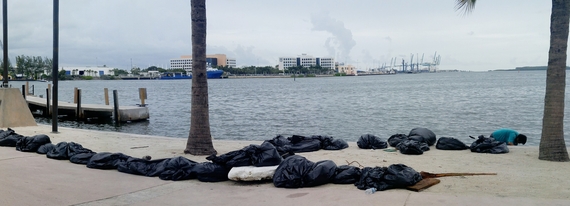Miami's plasticity factor isn't merely phony people and silicone implants; it's a giant chemical dioxin dump of garbage washing up on our shores. All you have to do is walk along our bay, look at the rocks, and there it is -- in your face -- as reliable as the tides -- as consistent as the waves -- no matter how much we clean the rubbish returns, and returns, and returns, and will return, until we change, a slight change in the paradigm, the managing of trash (literally and metaphorically); it's not that hard.
Every 3 seconds we use 60,000 plastic bags.
The amazing thing about plastic is it's built to last forever. The bittersweet nature of this is that 8 million tons of plastic make their way to the ocean each year. They make their way through currents to "hot spots" around the planet called an ocean gyre. There are five major drifting gyres on the planet and in these hot spots the plastic is so micro and tiny it is like plastic soup basically impossible to clean and clear. The plastic is winding up inside fish. It's everywhere and a big problem.
This problem must be solved not just by environmentalists but lawyers, artists, journalists, policymakers, students, engineers, and yes, CORPORATIONS too.
Emily Penn is a British architect pioneering renewable energy and changing mindsets. She travels the world studying solutions and occasionally delivering speeches. Ms. Penn was recently in Miami at events sponsored by the Earth Ethics Institute of Miami Dade College, a wonderful division of the university focusing on environmental issues and sustainability both locally and globally.
Emily Penn, a fast and engaging and clear communicator, and future Emily Penn's, will clean our oceans, will figure out how to combat climate change and rising seas, because our species cup IS half full of hope, and if we fill the other half with education, we WILL find a solution or at least die trying.
Our DNA isn't wired to be this material, this plastic.
And there are solutions.
Microbeads need to be banned. Plastic bags and water bottles should be re-used. Currently, only five percent pf plastic is recycled.
Bayfront Park Management Trust cleans plastic from the rocks by the Bay but it keeps coming.
A few years ago a 19-year old student invented a boon or dam like buoy that has the potential to trap the plastic soup so it's easier to scoop up and clean.
It's called the Ocean Cleanup.
Testing of this boon is in effect.
Right now they don't work properly in rough choppy water but this will change. Can Miami be a part of this? Maybe there is a boon in our future. Or other call to actions.
Who has an idea?
What is it? Share it!
Sometimes it's hard to motivate millennials.
The first generation raised on social media; their attention spans drift like currents of plastic (metaphor intended). Like me, Share me, Tweet me, me, me, me -- should morph into Like this, Share this, Tweet this, this, this, this. That. These.
These. Issues. Matter.

